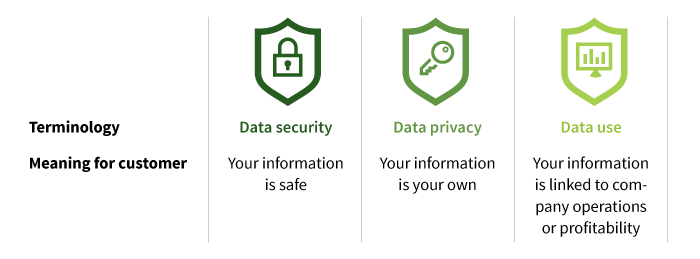- Data-related practices affect business models in dramatically different ways.
- Some businesses are boldly addressing data privacy and security issues.
- We look for companies that we believe are taking the lead.
The “S” in ESG includes data management
For many investors interested in ESG criteria, the “S” — or social — component is the least understood. This is partly because the measurement and assessment of social criteria is still evolving. Within this category, we are seeing much debate and discussion about how businesses handle data. Data-related practices affect business models in dramatically different ways, from company to company, over the short and long term.
References to data may be misunderstood
Data privacy, data security, and data use are all important issues — for businesses, their customers, and their investors. However, these terms are often used interchangeably when their meanings are actually quite different.

How we find leaders with strategic and financial advantages
In our analysis, we explore how companies are addressing their own roles and responsibilities in terms of data security, data privacy, and data use. Our key question is: Which companies are leading the way and moving entire industries forward with their innovative data standards and practices?
Data practices are evolving in a rapidly changing landscape, with the potential for significant new legislation and regulation in the coming years. We believe that many businesses, large and small, could capitalize on the opportunity to take the lead and gain long-term strategic and financial advantages.
Our analysis: Leaders in artificial intelligence
Artificial intelligence could be described as the next frontier in responsible data management, and its development brings a host of new questions. Two examples of leaders in this area, in our view, are Salesforce.com and Microsoft. Both companies are taking meaningful leadership roles in the development of ethical standards for artificial intelligence. They are demonstrating a deep understanding of current customer needs as well as emerging issues, which is helping to fuel strong growth in their businesses today.
Responsible data practices can bring financial advantages. The leading companies are demonstrating a deep understanding of current customer needs as well as emerging issues, which is helping to fuel strong growth in their businesses today.
Our analysis: Leaders in data privacy
In stark contrast to the defensive posture of some technology companies, others are boldly addressing data privacy and security issues. Salesforce Chairman and CEO Marc Benioff, for example, has called for a national privacy law to protect consumers.
Apple has also taken a strong stance on data privacy and the underlying principles of privacy rights. This has left the company less vulnerable to risks of misuse of data, consumer backlash, and increased regulatory pressure, all of which have been issues for Facebook and other companies over the past year.
A foundation for building effective investment portfolios
Our work in this area confirms our belief that a commitment to sustainable business practice and positive social impact often coincides with strong financial performance over the long term. With our research-intensive approach, we give equal emphasis to sustainability, the fundamental health of businesses, and the valuation of stocks.
Read more about how we invest our sustainability principles at putnam.com.
As of 1/31/19, Salesforce.com represented 4.54% of Putnam Sustainable Future Fund assets and 2.69% of Putnam Sustainable Leaders Fund assets; Microsoft represented 5.91% of Sustainable Leaders Fund assets; Apple represented 2.64% of Sustainable Leaders Fund assets. The Sustainable Future Fund did not own Microsoft or Apple. Neither fund owned Facebook as of 1/31/19.
316193
More in: Equity, Sustainable investing



